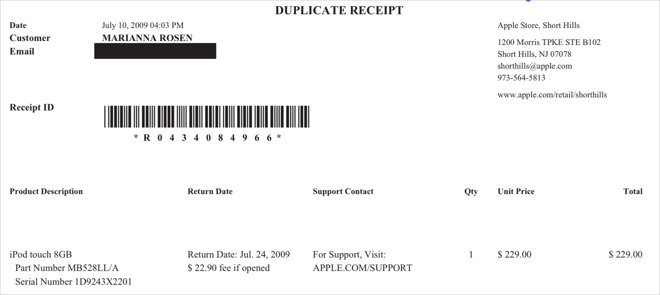In what could prove to be a major development in a class-action lawsuit involving Apple's iPod and iTunes, new court documents filed on Thursday reveal Apple is questioning whether a class even exists.

Evidence of plaintiff's 2010 iPod touch purchase, outside of case's time limit.
A letter from Apple to presiding Judge Yvonne Gonzales Rogers notes both plaintiffs named in the case have not produced evidence showing they owned an iPod purchased within the suit's effective September 2006 to March 2009 time period, reports The New York Times. The filing was entered at midnight and has been sealed from public viewing.
Apple is accused of creating a monopoly with FairPlay digital rights management (DRM), the iPod and the iTunes Music Store. As stipulated by plaintiffs, the class includes individuals and businesses who bought iPod classic, iPod shuffle, iPod touch or iPod nano models between Sept. 12, 2006 and March 31, 2009.
In its letter to Judge Gonzales Rogers, Apple said it researched the serial numbers of plaintiff Mariana Rosen's iPod and found the device was purchased in July 2009. Court documents show Rosen bought a 15GB iPod and a 30GB "video iPod" for personal use, as well as an iPod mini as a gift.
The second plaintiff, Melanie Tucker, is asserting a 32GB iPod touch purchased in 2010, a 20GB iPod purchased in April 2005 and an "iPod video."
"I am concerned that I don't have a plaintiff," Judge Gonzales Rogers said. "That's a problem."
The jurist plans to look into the matter independently, while plaintiffs' attorney Bonny Sweeney said she had not seen the documents provided by Apple and would respond later Thursday.
In its case against Apple, the class is seeking $350 million in damages, an amount that could be tripled to over $1 billion under U.S. antitrust laws.


